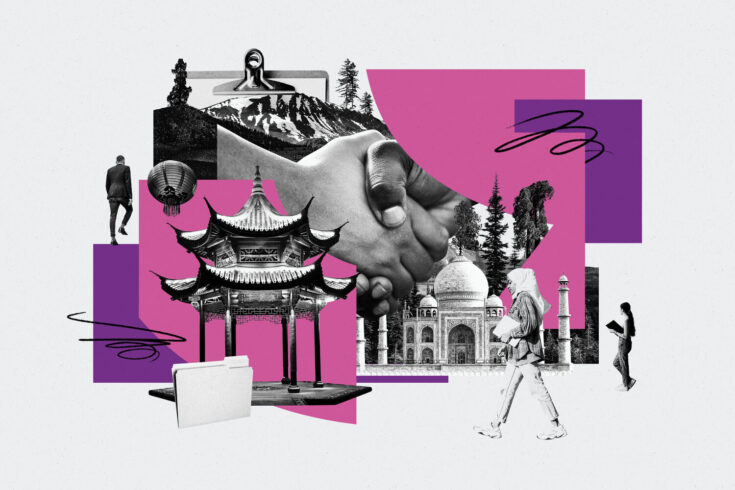My time in Bristol as a student of international relations sparked a lifetime of interest in other cultures and has shaped my career right until this day.
Discussing theories of international relations may sound a little dry, but the subjects sprang to life as I was debating them with fellow students from Cyprus, Taiwan, China and Bosnia.
Fast forward to today: I’m writing this in India, looking to help strengthen UK Research and Innovation’s (UKRI) global partnerships during meetings with many of our key stakeholders, covering issues from civil nuclear and agri-tech to gender equality. My visit is supporting the daily work of UKRI’s India team co-located in the British High Commission in New Delhi.
I’ve always believed that debating, working and ultimately researching with people from different backgrounds and nationalities enriches everything we do.
The evidence is there in black and white in the performance and in the make-up of the UK research community. It also shows, given multiple international challenges and uncertainty at the moment, this is no time to hunker down and turn inwards
What does international collaboration bring?
Nearly 60% of the UK’s publications in 2020 were co-authored with at least one non-UK researcher. These publications are cited, on average, 50% more often than domestic collaborations.
32.1% of all academic staff at UK universities are international staff. The COVID-19 response was only possible because of international collaboration (as well as investment in discovery-driven research and innovation).
Also, a huge amount of research cannot be done by one country alone. Take the International Thwaites Glacier Collaboration between the Natural Environment Research Council and the US’s National Science Foundation, which brings together scientists from the UK, US, South Korea and Sweden.
These scientists are developing new knowledge critical to making better predictions of how the ocean and ice will respond to environmental change. This work is only possible through the pooling of international research resources, including expertise, equipment and facilities.
Is international collaboration worth the effort?
Delivering research and innovation is undoubtedly ever more challenging. There are increasing pressures from inflation and energy prices, and we are all still recovering from COVID-19.
We face uncertainty about whether the UK will be able to fulfil its wish to associate to Horizon Europe. Geopolitics is in sharp focus with the suspension of collaborations with Russia and Belarus, and there are questions across the globe about academic freedom and research security.
However, I’m clear turning inwards isn’t an answer. The benefits of collaborating internationally far outweigh the risks and the additional resources required for due diligence.
Partnerships must be about mutual benefit
As I learned as a student of international relations, geopolitics has always been hard. Now as UKRI’s International Director and as a former British diplomat, I know international partnerships require time, consistency and effort to nurture.
Partnerships must be about mutual benefit. The focus now on research security is about managing the risk to ensure we protect the benefit and investments in the UK and protect our staff and work from potential theft and exploitation.
The due diligence does mean more work, and it isn’t easy. The Research England-funded ARMA research project will help us better understand how the research and innovation sector could do this most efficiently by exploring whether a national level service could work.
The benefits of international collaborations
I am privileged to see where international collaboration has brought diverse benefits. These range from cleaner drinking water through a ‘lab in a suitcase’ project, to greener, cheaper energy for communities across Africa, knowledge and job creation through capacity building in astronomy and helping create fairer voting systems around the world.
The mAfrica mHealth programme encapsulates for me the value of this research. This programme uses artificial intelligence to automatically interpret rapid HIV test results from photographs uploaded by the end user.
These tools and training protocols have been adopted by the Africa Health Research Institute in KwaZulu-Natal, South Africa, helping to manage and treat HIV.
This research has now brought global benefit. The algorithms from this programme have been used to analyse over 500,000 COVID-19 lateral flow tests as part of one of the largest self-testing surveys worldwide.
Research builds on research and international partnerships help ensure the flow of knowledge around the world.
How is UKRI supporting international collaboration?
Our work is based on the first UKRI international strategic framework. It explains how we partner in a fair and impartial way and help meet the United Nations sustainable development goals, how international partnerships support economic growth across the UK, and how we change funding mechanisms to make international collaboration less bureaucratic.
For example, in October, UKRI and the Research Council of Norway signed a Money Follows Cooperation agreement. This means UK researchers can join grant bids in Norway and vice versa. It reduces bureaucracy as collaborators only need submit one application.
The UKRI-Swiss National Science Foundation partnering awards allow mobility between researchers in the UK and Switzerland in a number of key technology areas.
We also have open funding opportunities with Canada on quantum, with the US across multiple disciplines and with Ireland on climate, and sustainable and resilient food systems.
So, what are we aiming for? Simply, to make international collaboration part of our institutional DNA. We need international partners to solve the challenges we face and for our economic growth. But it is much more than this. For me, it is the joy of learning from international partners and seeing the world differently as a result.
Top image: Credit: UK Research and Innovation




